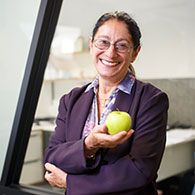Research conducted with the Raine Study falls under one of 14 special interest groups (SIGs).
One of those special interest groups look specifically at diet data.
The focus of the Diet Special Interest Group is to investigate the areas of human dietary behaviour across a range of ages.
This SIG utilises a range of measures on participants relating to infant feeding, including breastfeeding, and the timing of introduction of solids, food diaries and dietary behaviour and patterns.
The Raine Study dietary data is being used to better understand the relationships between dietary intake and the early development of chronic diseases, including heart and vessels disease, type 2 diabetes, obesity, bone disorders, and mental health disorders.
SIG Leaders
We are fortunate enough to have some well-known researchers from across Australia leading this SIG.
Dr Therese O’Sullivan, Edith Cowan University
 Dr Therese O’Sullivan is an Associate Professor in Nutrition and Dietetics at Edith Cowan University and also leads a program of research investigating potential health benefits of dairy in the diet. Alongside her teaching career, Dr O’Sullivan has also been a Clinical Dietician in a private practice as well as a Senior Research Fellow at the Telethon Kids Institute in WA.
Dr Therese O’Sullivan is an Associate Professor in Nutrition and Dietetics at Edith Cowan University and also leads a program of research investigating potential health benefits of dairy in the diet. Alongside her teaching career, Dr O’Sullivan has also been a Clinical Dietician in a private practice as well as a Senior Research Fellow at the Telethon Kids Institute in WA.
Dr O’Sullivan has received many accolades for her work in diet and nutrition including Famelab WA state finalist in 2014, ECU Vice-Chancellor’s Award for Excellence in Research by an Early Career Researcher in 2015, and ECU Minute to Pitch it runner up in 2016.
Prof Wendy Oddy, University of Tasmania
 Professor Wendy Oddy is a Professorial Research Fellow at the University of Tasmania as well as a nutritional epidemiologist investigating the impact of diet and nutrition, particularly during early childhood, on various diseases in the population.
Professor Wendy Oddy is a Professorial Research Fellow at the University of Tasmania as well as a nutritional epidemiologist investigating the impact of diet and nutrition, particularly during early childhood, on various diseases in the population.
Using the Raine Study data, Professor Oddy seeks to better understand the relationship between nutrition in early life and the development of chronic diseases including heart and vessels disease, type 2 diabetes, obesity, bone disorders, and mental health disorders.
Professor Oddy’s work continues to contribute to the Australian Dietary Guidelines, which are in turn used by health professionals, policy makers, educators, and food manufacturers to help Australians eat healthier diets.
Key Findings of the SIG
Thanks to the ongoing involvement of our participants, this SIG has been able to make a huge range of life-changing discoveries, including:
- Longer breastfeeding is associated with less risk of childhood asthma and improved motor development in late childhood and adolescence.
- Better quality breakfast is related to better mental health in early adolescence.
- Healthier dietary patters are associated with better behaviour, academic achievement, mental health, reproductive health, and less risk of developing heart, vessels and liver disease.
For more information on key findings from this Special Interest Group, visit our Diet Special Interest Group page.

